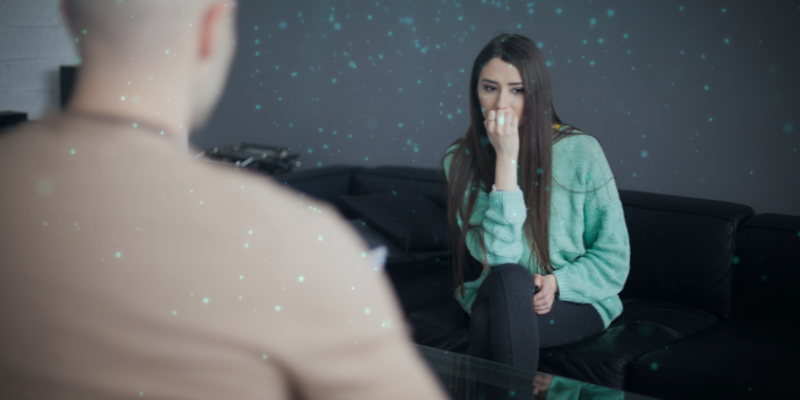
Do you feel like you could sleep all day? Does getting out of bed feel like a daunting task because your energy is so low? Does the thought of taking a shower, brushing your teeth, and seemingly minor tasks feel overwhelming or impossible? Have you noticed that you have headaches and stomachaches, and get sick more often? Are there days when you want to eat a whole pizza and others when you can’t imagine taking a bite of food? These could be some of the physical warning signs of depression.
Depression affects more than just your mood. Gastrointestinal issues, lower libido, sleep problems, restlessness, chest pains, headaches, and memory loss can all be attributed to depression. Click To Tweet
DEPRESSION IMPACTS MORE THAN YOUR MOOD
Depression can significantly affect your physical health. The neurotransmitters serotonin and norepinephrine influence both pain and mood, which helps explain the connection, but it’s more than the physical pain that is linked to depressive symptoms. Gastrointestinal issues, lower libido, sleep problems, restlessness, and plenty of other physical symptoms can all be attributed to depression.
Affecting an estimated 4.7% of the adult population and 11.5% of the youth in the United States, depression is the number-one disability in the nation and has a huge social and economic impact from the loss of work to relationship dysfunction. Suffering from depression is not just a minor interference that only impacts the person with the condition—family, friends, and co-workers are all impacted by a person who lives with depression.
13 PHYSICAL SIGNS AND SYMPTOMS OF DEPRESSION
1. Change in sleep.
Data from a 2022 study show that nearly 75% of depressed patients suffer from insomnia. Keep in mind that disrupted sleep and depression have a bidirectional relationship and sleep should be part of the equation when diagnosing depression.
2. Chest pain.
While chest pain occurs for a variety of reasons other than depression that should be considered and diagnosed, those who are depressed are likely to report that they have chest pain. Research published in The American Journal of Cardiology suggests that these pains can occur in people without other cardiovascular issues and narrowed that list to those who suffer from depression.
3. Fatigue and exhaustion.
Coupled with a lack of sleep, those who suffer from depression might be wiped out all the time and feel like they need to sleep at various hours of the day. Being depressed can cause exhaustion first thing in the morning or throughout the day, and overall weariness and depleted energy are common. Fatigue is more of a temporary event after engaging in a tiring activity, and exhaustion is more chronic and lingers. Both can be experienced with depression.
4. Aching muscles and joints.
Research links chronic pain and depression beyond minor physical pain such as a tense neck or shoulders. Since depression and pain share biological pathways and neurotransmitters, people who suffer from chronic pain can experience depression, and depression can cause chronic pain. An overall feeling of physical discomfort is common in those who are depressed.
5. Digestive problems.
A number of pathways connect the gut and the brain, especially the immunoregulatory, neuroendocrine, and vagus nerve pathways. Keep in mind that sleep, mood, pain, stress, and hunger are all regulated by the vagus nerve. A 2021 study found that those with depression have an increase in gut inflammatory bacteria, reduced short-chain fatty acid production, and the functioning of important neurotransmitters that affect mood. Gut health is imperative in helping with mood disorders such as depression.
6. Headaches.
Headaches can occur for many reasons and are not solely because of depression, so finding the source is important to treat the issue properly. However, research conducted in 2016 shows a connection between tension headaches and people who have depression.
7. Changes in appetite or weight.
Some people with depression have an increased appetite and others can’t imagine eating anything at all. Research conducted in 2020, published in Brain, Behavior, and Immunity found that inflammation in certain areas of the brain can cause appetite changes in people who are depressed.
8. Back pain.
While back pain can be caused by myriad issues from herniated discs to arthritis and pinched nerves, there is evidence that people with chronic low back pain are 3-4 times more likely to be depressed. Coping with pain is difficult on its own but coupled with depression can be debilitating and severely interfere with daily functioning. Understanding the effect of chronic pain on brain functioning is important to help treat symptoms.
9. Agitation and restlessness.
There are various forms of depression listed in the Diagnostic and Statistical Manual of Mental Disorders (DSM-TR-5), one of which is Agitated Depression. However, even without that specific diagnosis, it is common for depressed people to experience agitation and restlessness that can occur simultaneously with an inability to perform basic tasks. A feeling of jitteriness, uneasiness, and difficulty relaxing can contribute to sleep problems as well, which impacts depressive symptoms.
10. Sexual problems.
Low libido is frequently experienced along with depression. A study published in the journal Clinical Depression noted that 40% of men who report depression have reduced sexual interest and have difficulties reaching orgasm. Women who are depressed have certain brain regions—including the middle occipital and temporal gyri, hypothalamus, anterior cingulate gyrus, thalamus, and amygdala—that are less activated when visualizing sexually stimulating imagery. Sexually intimate relationships can suffer as a result of depression, which is often a factor, but changes in the brain have a major impact on libido.
11. Inflammation.
According to a 2019 study, inflammation affects both the peripheral and central nervous systems, resulting in increased activity in the immune system. Inflammation can set off a domino effect of problems throughout the body. Knowing that depression is connected to inflammation in the brain is an important factor in determining how to best treat the condition.
12. Compromised immune system.
Are you getting the common cold or flu frequently? Do you often feel “under the weather” or like you’re on the verge of getting sick? Inflammation has a negative effect on the immune system as it works overtime in a person who is depressed. Someone who is depressed is also more at risk of illness due to changes in sleep patterns, appetite, and physical activity.
13. High blood pressure.
There is an increase in sympathetic nervous system responses (heart rate increase, vasoconstriction) as well as the secretion of adrenaline and cortisol in people with depression and hypertension. This close connection is important to consider when seeking medical support for depression. Research supports the link between the 2, and showed a 9 times greater occurrence of hypertension in depressed people than in those who are not depressed.
WHEN TO SEEK HELP FOR PHYSICAL SYMPTOMS OF DEPRESSION
If you’re experiencing any of these lingering physical symptoms, it’s a good idea to make an appointment with a healthcare provider. Ruling out certain causes may be helpful in determining if your symptoms are due to physical issues or depression.
Depression and other mental health issues can’t wait. At Amen Clinics, we’re here for you. We offer in-clinic brain scanning and appointments, as well as mental telehealth, clinical evaluations, and therapy for adults, teens, children, and couples. Find out more by speaking to a specialist today at 888-288-9834 or visit our contact page here.





Having just experienced a major bereavement, I found it very helpful to go through this list a month after my husband died. I realized I needed to focus on my health finally and had to accept the reality of depression when I do not think of myself as a depressive but 9 out of 13 symptoms convinced me to increase my supplementation, change my exercise and self care routines and I can feel the benefits. I also found Light Therapy and Acupuncture and Osteopathy to be very helpful. I count the work of Dr Amen and his colleagues to have been a major Blessing in my life both at a personal level and professionally as a Nurse Therapist. Thank you
Comment by Susanna — April 12, 2023 @ 8:06 AM
Have all the symptoms, but, what to with?
I don’t want to take something with a ton of side effects!!
Comment by Fern — April 12, 2023 @ 9:30 AM
Hello Fern, thank you for reaching out. For more information about brain SPECT scans and our services, please contact our Care Coordinators: https://www.amenclinics.com/schedule-visit/.
Comment by Amen Clinics — April 17, 2023 @ 9:58 AM
Your information has been very helpful thank you
Comment by Donald Legerski — May 3, 2023 @ 5:20 AM
I always think about my ways, most of them are the symptoms pof depression, such as: (1) lack of appetite, (2) lack of sleep, (3) not being up to myself as in: staying at home nand in the bed all day and night, (4) taking antideressants, (5) drinking a lot untill I get sick with alcohol poisoning,(6) very conversetive: such as: not active enough,but kinda active, but tbnot wanting to do things, but then,on the other hand,make hasty decision and act on impose and failing at everything, and blaming everyone else for my problems and create another type of world, where I could go and pretend that I was invisible, and the Doctors said I was clinical depressed and wrote it as Bipolar.. Then came my mood swings, witch caused me to have violent brust out toward everyone I literally black out and don't know what I am doing, when I come too, I cry and my speach sounds like I had a stroke while I was lashing out, it takes about two weeks to get my speach right.so then off to a mental hospital so I can think about what I have done. I can't tell what I did, because I don't know.. But, the Doctors tell my family not to say a word to me so I can try to put things together on my own…. Sometimes I can and other times I can't so we leave it alone.
Comment by Crystal S Sanchez — June 26, 2023 @ 4:44 AM
What supplements could take the place of keppra (rage) .. for my adult son .. long story but can’t handle the keppra rage .. but he is also on Vimpat and Depakene as well for status epilepsy
Comment by Annette’s — June 26, 2023 @ 6:59 AM
Thank you for reaching out. For more information about Dr. Daniel Amen's recommended supplements, visit https://brainmd.com/.
Comment by Amen Clinics — June 26, 2023 @ 2:04 PM
My son who is 34 years old has frequent insomnia.
Comment by Joseph Cecil Pereira — November 25, 2023 @ 11:38 AM